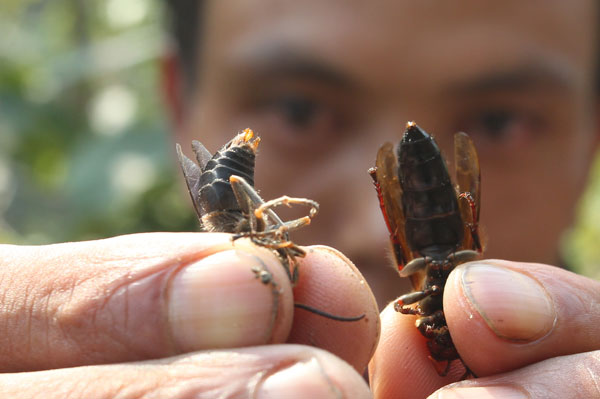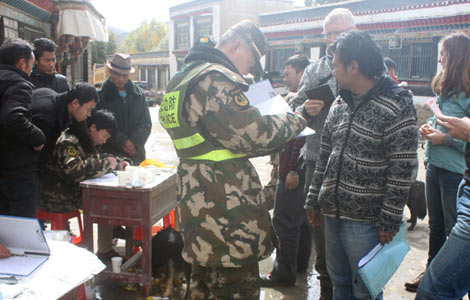Killer hornets wreak havoc
Updated: 2013-10-16 07:43
By He Na (China Daily)
|
||||||||
The war on hornets
This year's hornet infestation is nothing new to the villagers, whose lives have been disturbed and whose safety has been threatened for more than a decade in Ankang, the epicenter of the attacks.
 |
|
Hornet stings, which are roughly 6 millimeters long, are used to inject a poison so powerful that it can dissolve human tissue. Photos by Ruan Banhui / for China Daily |
According to Li Tiesheng's research, 36 people in the city died from hornet stings from 2002 to 2005. There are some 12,000 hornets' nests scattered across Pingli county, while the human population numbers 220,000.
The rapid increase in the number of hornets has become a huge threat to the safety and property of local people, and the task of killing hornets is at the top of the agenda in some areas.
In addition to local government warnings posted online and pasted to walls and roadside trees, a number of methods have been employed by local fire brigades and villagers to destroy the hornets' nests, including the use of fire, water and gasoline.
However, while local governments have spared no efforts to deal with the hornets, the results have been less successful than anticipated. Li Tiesheng blamed the relative lack of success on inappropriate methods, which fail to take the hornets' habits and lifestyles into account.
"They are easy to deal with if you know their habits and character well," he said.
"When the temperature falls below eight degrees Celsius, adult hornets will abandon the nest to find shelter from the winds during the long winter. Generally, 1,000 to 2,000 will swarm together in the corners of buildings, such as those used to house pigs. The hornets don't move or eat during the winter, they just sleep. The villagers should search out these gathering places during the winter and use pesticides to kill the hornets. That would be an effective way of reducing their numbers.
"Hornets begin building their nests in winter. Each hornet builds its own nest, which increases in size as the offspring develop. It's easy to destroy the nests if fewer hornets are inside," he said.
He also stated that hornets are night blind and therefore the hours of darkness, especially rainy nights, are the best times to fight them.
Yang Guanhuang, a researcher at the Bee Research Institute of the Chinese Academy of Agricultural Sciences, advised covering the nests with red cloth bags late at night. Once the insects are safely contained in the bag, it's easy to use water or pesticides to kill them.
Most Viewed
Editor's Picks

|

|

|

|

|

|
Today's Top News
A life devoted to China-US ties
US inches toward deal to reopen govt
Alcoa CEO to be feted by US-China Committee
Hong Kong and AmEx throw culinary extravaganza
'Against human nature'
Nation honors father of Xi Jinping
Information transparency vital for image
$100b trade target for 2017
US Weekly

|

|
















